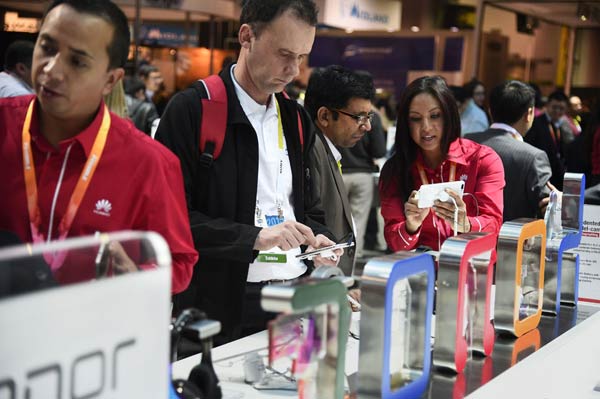 |
|
Attendees examine the Huawei Honor 6 Plus and Honor P7 smartphones on Jan 6 at the Consumer Electronics Show in Las Vegas, Nevada.[Provided to China Daily] |
Two years after US legislators claimed it was a national security threat, China's Huawei Technologies Co Ltd is planning a campaign to win over US consumers, rolling out new mobile phones and wearable devices backed by a marketing effort.
The Chinese smartphone maker, already with more than $40 billion in annual revenue from a wide range of telecom gear and products, is preparing to introduce Americans to several of its smartphones and wearable devices this year, including its youth-oriented "Honor" phone, Huawei officials told Reuters.
The company's 2015 US plans, which have not been previously reported, will encompass traditional advertising, online promotion and sports team sponsorships, said Huawei's US spokesman Bill Plummer.
Huawei is changing its approach to marketing as it tries to shed its image as a purveyor of cheap technology products - a common perception issue for many Chinese companies. It is an important shift for a company that for years had been single-mindedly focused on engineering and relatively dismissive of consumer branding.
In December, it touted its new Honor 6 Plus phone on a billboard in New York's Times Square. Plummer said that was "a sign of things to come".
He declined to say how much Huawei will spend on its new marketing campaign or what sports team, or teams, it had in mind. It already sponsors London soccer club Arsenal, cricket teams in India and rugby clubs in Australia.
At the Mobile World Congress on March 1 in Barcelona, Huawei took the wraps off a smartwatch that will be sold in over 20 countries including the US.
Huawei now intends to appeal directly to consumers with several new phone models, both low end and high end. It hopes to secure deals with carriers, selling online through marketplaces, such as the one operated by Amazon.com, and on its own fledgling gethuawei.com US direct-sales website.
It is unclear how open the carriers, who dominate US sales, would be to carrying phones from Huawei, a brand that remains unknown to the majority of American smartphone users. Reviews of its high-end phones, which can cost hundreds of dollars without a plan, have been generally positive.
Still, the US market is dominated by Apple Inc and Samsung Electronics. None of the four biggest US carriers - Verizon, AT&T, Sprint or T-Mobile - currently sell Huawei phones on their websites and all declined to say whether they have had talks with the Chinese company.
Huawei said in 2013 it would focus on other markets after its products were labeled an alleged national security risk in a US Congressional report. Huawei denied the claims made by the report.
A White House-ordered review found no evidence of a security risk.
Lawmakers' concerns revolve primarily around Huawei's networking equipment. And analysts say that a lack of brand recognition is a bigger hurdle for Huawei's smartphone ambitions than pressures from Washington.
Huawei currently has less than 1 percent of the US market, according to research firm IDC. But it can perhaps draw inspiration from China's ZTE Corp, which has gained 6.4 percent of the US market by selling cheaper smartphones and working with second-tier carriers like Boost Mobile, according to Ramon Llamas, a research manager at IDC.
Online sales, particularly as no-contract plans that require consumers to purchase a full-price phone, gain in popularity, represent perhaps the best option for Huawei, said Gartner analyst C.K. Lu, adding that he sees it having a tough time signing carriers.
"The US market is tough for anybody except Apple and Samsung," said Lu.
